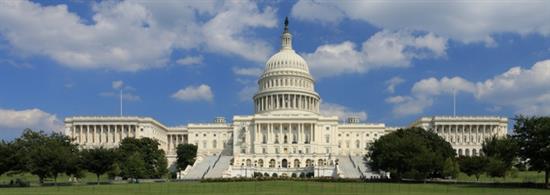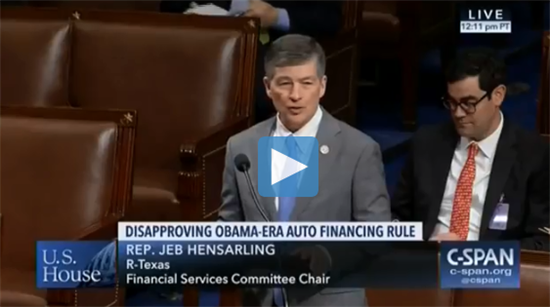House Votes to Repeal Harmful BCFP Auto Lending Guidance
Washington,
May 8, 2018
The Bureau of Consumer Financial Protection – which many of us know as perhaps the single most powerful, unaccountable agency in the history of our republic – a few years ago issued guidance. Guidance that essentially outlawed the practice of auto dealers in America being able to take wholesale financing from third parties and charge retail rates. They did this because the Bureau claimed, claimed that the practice potentially violated the Equal Credit Opportunity Act, known as ECOA. Well, Mr. Speaker, there were several different problems with this approach, not the least of which is that Section 1029 of Dodd-Frank forbids, forbids the Bureau from regulating auto dealers. It’s in the law. And so many of my friends on the other side of the aisle come to this very floor to jealously, religiously, unrelentlessly defend the Dodd-Frank Act. I’m anxious to hear their voices today because to defend the Dodd-Frank Act, you must, you must vote to overturn the Bureau’s guidance. Because this was absolutely trampling upon the sacred ground of Dodd-Frank. Now, I didn’t support Dodd-Frank, but it’s the law of the land, Mr. Speaker. Shouldn’t lawgivers, in this Chamber, be committed to the rule of law? The law that had been passed by the United States Congress, signed into law by the President of the United States. So no less of an authority than Dodd-Frank says “Bureau, thou shalt not regulate auto dealers,” but they attempted to do it. So, that was Sin Number One. Sin Number 2: They didn’t engage in rulemaking. This was guidance. Now, guidance is supposed to tell a market participant ‘okay, we understand what you’re trying to do and what you’re trying to do is permissible.’ But instead, the Bureau flipped it on its head and said no, you are not allowed to do X, Y, and Z, which is essentially rulemaking, Mr. Speaker. And so, what the Bureau did was they violated the Administrative Procedures Act, which is there to assure that market participants receive due process. They’re allowed notice. They’re allowed to comment. They’re allowed to participate in the democratic process by which rules are promulgated. And so, again, what the Bureau did was, as opposed to engaging in formal rulemaking as demanded by the Administrative Procedures Act – which, by the way, was essentially defined by the Clinton Administration – they violated it. They just threw it out. Their problem here, Mr. Speaker, is the Bureau, which claimed under its former Director, Mr. Cordray, now gubernatorial candidate, that they were a data-driven bureau. Well, guess what. They couldn’t come up with any data of this purported violation of the Equal Credit Opportunity Act, they claim that somehow, that there was unconscious discrimination on racial basis known as “disparate impact.” But where was the data? Auto dealers by law cannot keep records on the racial characteristics of their customers. So, what did the very enterprising Bureau do, Mr. Speaker? They guessed. Now, they came up with a very great academic name for it, Bayesian Improved Geocoding System. You know what that means, Mr. Speaker? They guessed. They looked at somebody’s last name. They looked at a zip code. They scratched their head. “Oh, that person must be of Asian heritage. Oh, that person must be of European heritage. Oh, that person must be of African heritage.” They made it up. They had no data, and so they made it up. Now, because of all this, in the previous Congress, Mr. Speaker, this body voted overwhelmingly, overwhelmingly to overturn the guidance. The vote was 330 to 296. Unfortunately, the Senate did not act then. Fortunately today, the Senate has now acted. And so, this body has the opportunity to overturn these many wrongs. And let me end with this wrong: consumers are being hurt. Analysis by the Wall Street Journal shows that many credit worthy borrowers, because of what the Bureau has done, will have to pay up to $586 more, $586 more for their auto loans because of what the Bureau has done. Because of that, under the Congressional Review Act, it is time for Congress to say “we said what we mean, we are going to protect consumers, we are going to overturn the Bureau’s guidance, and we’re going to do it today.”
|



